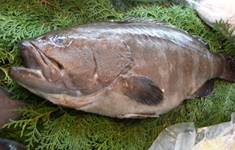 A slowdown in luxury spending as well as imports facilitated by a free trade pact with southeast Asia have squeezed China’s grouper fish cultivators. Production has outstripped demand with daily sales down 300,000 kilograms nationwide according to data published by Shuichan Pindao, a seafood consumption research agency based in Beijing.
A slowdown in luxury spending as well as imports facilitated by a free trade pact with southeast Asia have squeezed China’s grouper fish cultivators. Production has outstripped demand with daily sales down 300,000 kilograms nationwide according to data published by Shuichan Pindao, a seafood consumption research agency based in Beijing.Grouper prices in 2012, even in the Spring Festival, sank to the lowest on record, a slump blamed on a frugality campaign pursued by China’s new leadership as proof of its anti-corruption credentials. Demand for blue grouper, a favorite of official banquet tables in China, has fallen hardest: a 500 gram to 650 gram sized blue grouper costs CNY 30 (USD 4.8, EUR 3.70) per 500 gram at wholesale, and 1000 gram to 1500 gram sized costs only CNY 30 per 500 grams.
“The sales price is even lower than its cost price,” claimed Shuichan Pindao. Citing a survey of fish markets nationwide, Shuichan Pindao noted that 500 gram to 650 gram tiger groupers cost CNY 45 (USD 7, EUR 6) to CNY 46 (USD 7.4, EUR 5.7) per 500 grams in late March, whereas 1 kilogram-plus sized spotted grouper sold for CNY 100 (USD 16, EUR 12) per 500 grams.
Those prices correspond with fish markets in Beijing which sell cultivated grouper for prices equivalent to farmed species like seabass and yellow croaker. Tax-free imports of grouper from Taiwan and Southeast Asian countries are imported in China, reported Shuichan Pindao, pointed to the ASEAN–China Free Trade Area (ACFTA), a free trade area with the ten member states of the Association of Southeast Asian Nations (ASEAN) in force since 2010.
Shuichan Pindao also noted that this year grouper fry costs half last year’s prices. Meanwhile, grouper farmers have been badly affected by a government blueprint to transform the island province of Hainan (also a key region for tilapia cultivation) into a tourist hotspot. Under the “plan of Hainan International Tourism Island Construction and Development (2010-2020),” grouper aquaculture ponds have to be moved. “But the companies did not find the proper place to move the ponds, they are still searching the right place, but with a lot of pressures,” according to the Shuichan Pindao report.
Even though Chinese grouper cultivators are under pressure, demand for wild-caught grouper appears to have held up. A high-end restaurant chain operating eight restaurants in Beijing and two in Shanghai, Zheng Yuan (Seafood Garden) — part of the Grand Mansion group —showcases rare, high-value species such as grouper and wrasse in the reception area of its outlet in Beijing’s Chaoyang district. Staff told SeafoodSource spotted grouper seen in a fish tank in the restaurant lobby sell for CNY 480 (USD 77, EUR 59) per 500 grams.
Government banquets account for a major part of the outlet’s revenue, according to staff, with per person spend averaging at CNY 500 (USD 81, EUR 62). Some species were labeled in the restaurant menu — South African and Australian abalone, for instance, and “deep-boiled Galapagos giant tortoise” — rare fish like grouper are listed in a separate sheet of paper with no official restaurant mark, suggesting sources change frequently.
China’s grouper breeders normally have to clear out their stocks before winter, contributing to a drop in the fish’s price. The downward trend in prices was usually only temporary and would return to normal. Taiwan’s grouper cultivators have claimed that warmer waters and better cultivation techniques have given them the edge over mainland Chinese peers.
China’s new Communist Party leadership late last year pledged to cut corruption by banning lavish banqueting beloved of officials — and criticized by taxpayers — nationwide. High-end restaurants immediately took a hit, with the turnover of high-end restaurants in Beijing dropping 35 percent during February’s Chinese New Year celebrations, according to the Ministry of Commerce.





